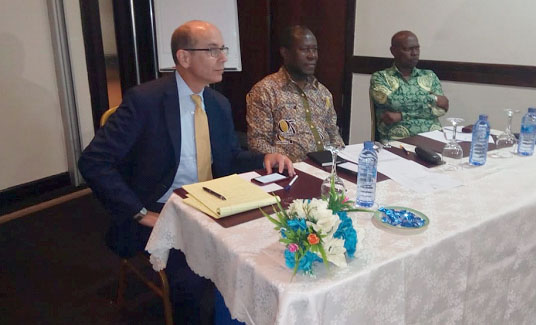Mr. Scobey (right), Mr. Aidoo (middle) and Dr. Yaw Adu Ampomah, Deputy CEO of COCOBOD
THE GHANA Cocoa Platform (GCP) has been re-launched as part of efforts to scale up sustainable cocoa production in the country.
GCP is an initiative aimed at enhancing public-private dialogue and joint action planning to ensure sustainable cocoa production in Ghana.
It was first introduced in 2013 during the erstwhile National Democratic Congress (NDC) government, with support from the United Nations Development Programme (UNDP) but came to a halt after awhile.
The re-launched platform shall be chaired by the Chief Executive Officer (CEO) of COCOBOD or his deputy, with the strong participation of farmers, the World Cocoa Foundation (WCF), farmers groups, non-governmental organizations, licensed cocoa buying companies, public and private sector institutions and actors.
The platform seeks to facilitate multi-stakeholder solutions to promote a sustainable cocoa sector for Ghana.
It shall organize a series of plenary meetings for all stakeholders on a regular basis, with such meetings to be supported by a combination of technical papers and technical committees.
The technical committees are expected to be organized around specific areas for intervention defined by members of the platform.
Speaking at the re-launch on Friday, July 6, in Accra, CEO of COCOBOD, Joseph Boahen Aidoo, explained that efforts to realize sustainable cocoa production in Ghana could be realized through informed engagements among key stakeholders in the sector.
He indicated that ethical issues such as child labour and deforestation, climate change and illegal mining shall be considered at meetings to be organized by the platform.
President of WCF, Richard Scobey, in a brief remark described cocoa as the “jewel” of Ghana but was quick to add that the crop had faced several challenges over the years.
He stressed that the challenges could not be solved by a single individual, government or organization; he observed the need for sustained policy dialogues.
BY Melvin Tarlue


